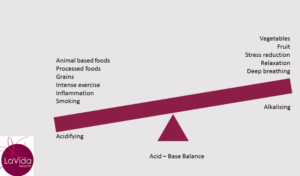The vagus nerve is one of twelve nerves originating in the brain passing through the neck to the abdomen. It plays a key role in both the sympathetic nervous system (our stress response) and the parasympathetic nervous system (our rest and digest response). It is a two-directional pathway linking your gut to your brain as well as sending signals to and from other internal organs. In addition to its role in your stress response, it also controls vital body processes such as digestion and heart rate.
Have you heard of the ‘gut-brain axis’? That is your vagus nerve.
Why is the vagus nerve important?
Because this nerve is bidirectional, it sends signals from your organs to your brain about the health of these organs. It also sends messages from your brain to your organs to either prepare for a stressful event or calm you down when you are not in danger. The effects of this two-way system are of course something we all feel regularly and our survival depends on it.
An easy way to think of it is to consider your response to a potentially dangerous or threatening situation. Your fight or flight response is activated to help you get out of danger. And conversely, when you no longer feel threatened your brain sends the message to your organs that you are safe and the vagus nerve slows your heart rate, allows your digestive processes to work again the way they should, and you feel calm.
Optimal communication between your organs and your brain should be balanced, with few short-lived stressful situations. However, many people carry underlying stress all the time.
How does the vagus nerve impact your health?
Stimulating the vagus nerve is an interesting area of research. It is being considered as a treatment option for many chronic health conditions, particularly heart disease, depression and epilepsy. The vagus nerve also plays a part in controlling immune function (including inflammation in the body).
A vagus nerve that is not “toned” (i.e. balanced) can impact your health in a number of ways.
Research shows that the gut microbiome (the bacteria in your gut) is disrupted in times of prolonged anxiety or stress. A disrupted gut microbiome alters your neurotransmitters, those feel-good chemicals in your brain (it’s that two-directional signalling again).
So, whilst research into all the health implications of a poorly toned vagus nerve is in its infancy, we know that improving the tone of your vagus nerve can have some significant health benefits especially for your stress levels.
If like me, you like data, you can monitor the tone of your vagus nerve through your heart rate variability. There are a number of devices/apps which enable this. Heart rate variability refers to the extent to which the intervals between heartbeats vary from one beat to the next. The higher your HRV, the better the balance of your nervous system and the tone of your vagus nerve.
Your heart rate variability benefits from a toned vagus nerve and can be used as a measure of a balanced nervous system.
How can you improve the tone of your vagus nerve?
There are many ways to tone your vagus nerve for the benefit of your stress levels and overall health. They all help to switch on your parasympathetic nervous system, allowing your body to rest, digest, deactivate inflammatory signals, boost your immune system and calm your nervous system.
These include:
- deep breathing (with focus on the diaphragm and belly and slow exhalations)
- meditation
- yoga, especially Hatha, yin or slow yoga
- chanting, humming or singing
- cold immersion (eg in the shower or ocean for a brief period)
- listening to soothing voices or sounds such as guided meditations, gregorian chants, waves on the ocean
- getting out in nature (less screen time, more green time)
- connecting with a partner, friend, family member or pet
- massage
- maintaining a healthy gut microbiome
You don’t have to take up all of these suggestions. Adding in even one or two consistently will make a difference.
Have you ever been to a yoga class and engaged in chanting ‘Om’? This chanting creates a vibration sensation that is transmitted through the vagus nerve, calming the nervous system.
If you’re one of my naturopathy clients you will often hear me recommending regular relaxation, meditation or yoga as part of a healthy lifestyle.
A simple breathing exercise for you to practise
A great way to get started is to try the ‘humming bee breath’. This is how you do it:
- Find a comfortable seated position
- Use your forefingers to gently block your ears
- Close your eyes and take a deep inhale
- On your exhale, hum
- Repeat 7 times
During this exercise, notice the vibration of your humming in your ears. Notice the silence and quiet in between hums, and the residual vibration moving through your body. This is a really simple way to improve the tone of your vagus nerve every day. Follow it up with deep breathing for as long as you can sit comfortably (even just a few minutes), expanding your belly with each inhale and emptying your belly with each exhale. Enjoy!
And if you want more suggestions, here are some more tips on managing stress if you are interested.





